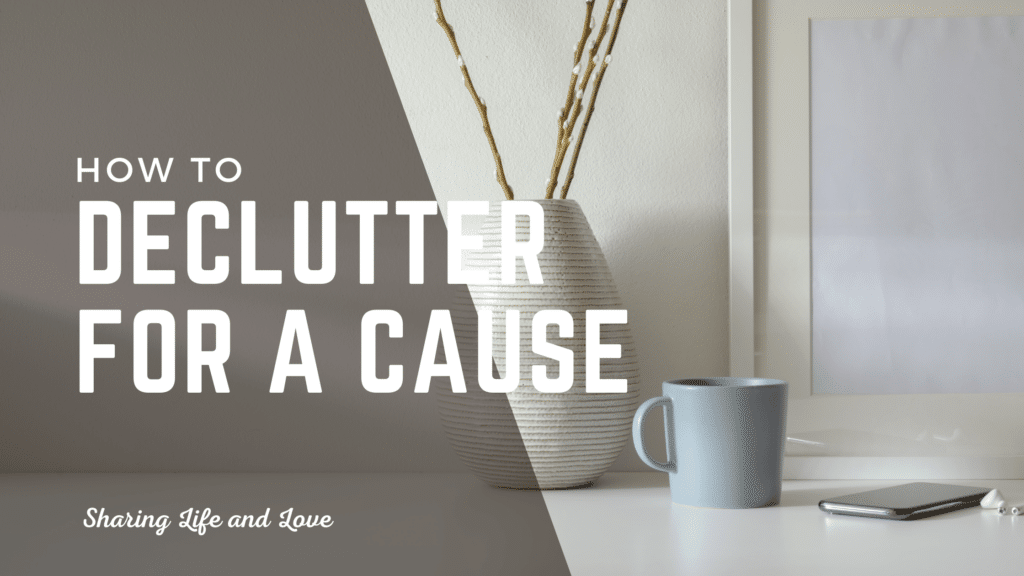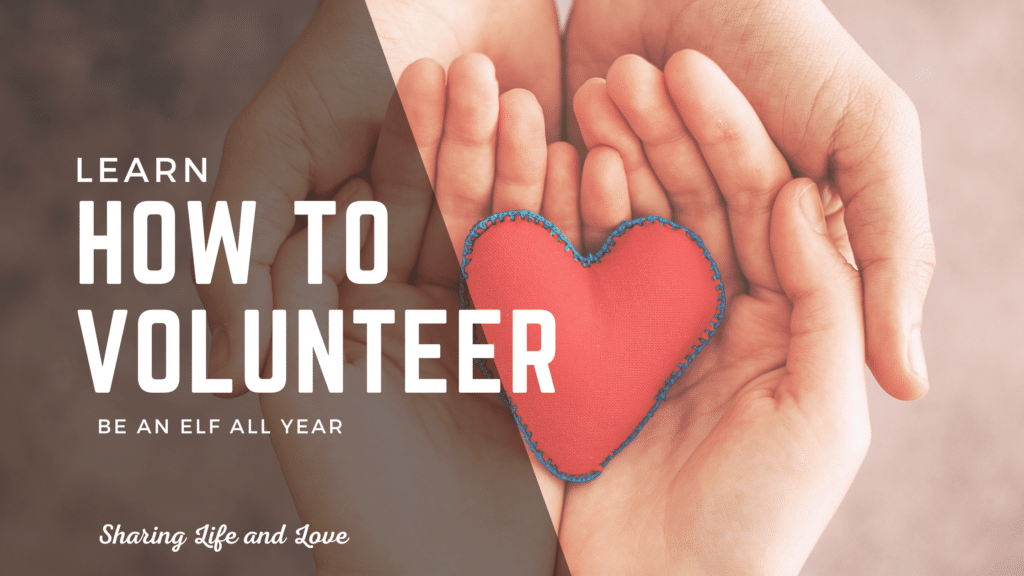February is Declutter for a Cause month! This means that you get two benefits from organizing your home this month – decluttering and giving!
You get a chance to organize and declutter your home! This holiday gives you the motivation and inspiration to get it done! You have a great reason to do this because you get to give back to a charitable cause!
What more motivation do you really need to get started than a Declutter for a Cause holiday??
Are you ready to get to work??
When you make the decision to declutter your home, it’s important that you have the right mindset. If you are going to declutter for a cause, think about the people who might need the things you are donating. What kind of things would you want if you didn’t have all the belongings that you do? What would mean the most to you if you were in the position of needing things?
Knowing that you can do something great for someone else is a solid motivator! As you follow the tips, advice, and download the free checklist in this article, remember why you are doing this!
What Does Declutter for a Cause Mean?
Declutter for a Cause month is a 28-day (it happens in February) motivational initiative for people to declutter their homes and offices to donate their belongings to a nonprofit in need.
The cause is meant to encourage people to donate their unused or unwanted stuff to charities. Many charities are underfunded and overworked and need support. Dylan Matthews offers some guidance on which charities to give to if you are interested in reading more about that.
How can you start your own cause to donate to this month? Consider setting up a school fundraiser or charitable event at your child’s school, a yard sale or garage sale from your home with a friend, or get creative and come up with another way to increase nonprofit awareness.
You can start a fundraising event on Facebook easily from the comfort of your home. Use your business network to spread the word about what you are trying to do for a nonprofit organization. Your place of work may be the perfect location to discuss this cause!
Why Should You Declutter for a Cause?
Decluttering for a Cause also means that people are incentivized to declutter their homes and offices to create a more peaceful, welcoming environment.
Having fewer belongings means less stuff to clean, less stuff to count, fewer storage locations for your stuff, and just less stuff to look at. Think about not having to spend time looking for things as you try to rush out the door.
Less stuff just means less hassle! It also means a calmer, healthier YOU!
An uncluttered home makes a calmer, more collected environment. This can improve your mental health, decrease your stress levels, and help you contribute to society or your community in a real way. Decluttering increases your self-worth, your healthy habits, and the efficiency in which you perform tasks, according to the U.S. News & World Report.
If you have a clutter problem, you may find it relaxing or soothing to declutter and make your own minimalist space, also known as a simple environment free of excess stuff.
For further reading on how to be a minimalist, I would highly recommend the expert of organizing and decluttering, Marie Kondo. You can take her Tidy Course and learn everything for yourself, or catch her on your favorite streaming station, Netflix. Her show, Tidying Up with Marie Kondo, is very inspirational!
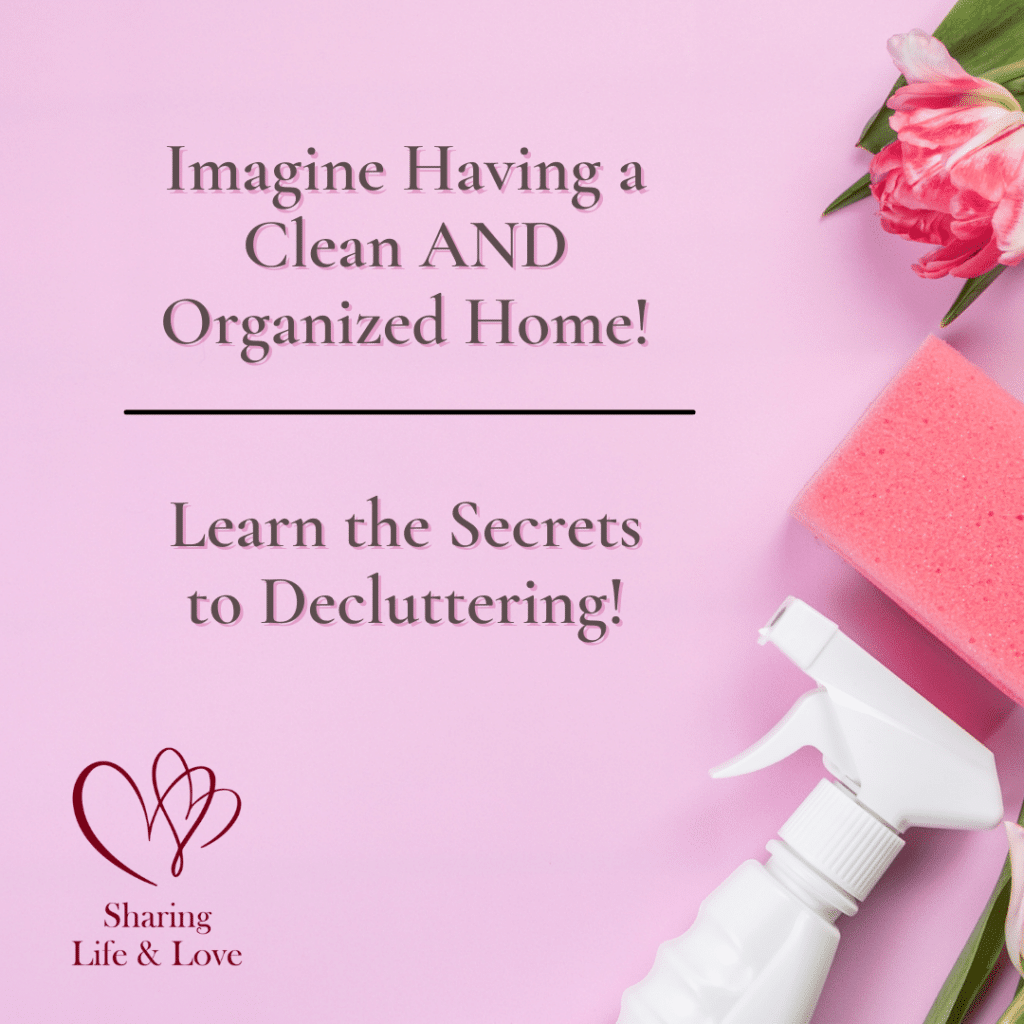
How to Declutter for a Cause: My Foolproof Secret
I have practiced cleaning and organizing my space my entire life. My experience has taught me that having an organized, minimalist environment makes me feel better – about myself, my life, and my accomplishment of tackling a messy space.
I love looking at something that was once cluttered and seeing the beautiful new space I have created!
So, how can you declutter your space in a simple way?
- Start with three trash bags, three boxes, three baskets, or three Rubbermaid tubs.
- One bag will be for trash and/or recyclable materials.
- One bag will be for items that do not belong in that space.
- One bag will be for belongings that you will donate to charity.
Similarly, you may want a bag for things that need to be mended/repaired, a bag for items that need to be returned to the person you borrowed it from, a bag for stuff that goes back to the place it is from (return library books to the Library), and a bag for things that you plan to sell on Craigslist, Facebook marketplace, or another similar website.
It’s really up to you how many bags you want to try to keep up with. If you are just starting out decluttering, I would recommend only the three bags – trash, put away, and donate.
Next, regardless of the space that you are decluttering, you will want to sort your belongings into one of the three bags. If you find something that is questionable, something you are unsure about, set it aside for now. You can deal with it later.
As you get started, you’ll want to move swiftly through your stuff and not stop to analyze every single item. If you get stuck on something, set it aside, so you can keep going.
Here are some key decluttering tips to follow.
- If you haven’t used it in the last year or two, consider getting rid of it.
- If it’s expired, throw it away. If you have pantry items that have expired but have not gone bad, you can take a box of them to a local food bank and let them decide if the items are good or bad. Don’t spend too much time analyzing anything.
- If you haven’t touched the item in the past ten years, get rid of it.
- If you do not like the item and do not use it, get rid of it.
- If you think you “might” use an item but haven’t thought about it in years, weigh the pros and cons of keeping the item.
- When was the last time you could have used this item, and why didn’t you?
- Could you easily replace the item?
- Is it worth the trouble of selling it if you think it has significant value?
- Would you feel better if it went to a home that needed it more than you do?
- How much would it cost to replace the item?
- How much trouble would it be to keep the item (storage, cleaning, etc.)? What is the hassle of keeping it?
Really think about that last question. You want to make sure that you aren’t holding on to anything you don’t need. If you want to create a minimalist space, you’ll want to trim down. That means keeping only the things you use, need, and want.
Repeat that last sentence: Only keep the things you use, need, and want. Don’t keep anything you don’t like. Don’t hold on to things you don’t need, and if you don’t plan to use something, get rid of it. If you decide later that you need something, you can always buy a new one.
If you have questionable things that are irreplaceable, you might want to put them in a bin and store them in the garage or attic. That way, if you decide you need those items, you still have them. There is some comfort in knowing you can access your belongings even if you don’t need them. Don’t be too hard on yourself.
I understand this, which is why I’m recommending keeping only one bin of questionable items. Any more than this will mean that you need to declutter more.
Don’t get me wrong; keepsakes are important. Hold on to your memories, but in moderation. Put them all in a hope chest or memory box, and put them somewhere in your house that is comforting to you (guest room, attic, etc.).
Do you feel confident in the “3-bag system”? Are you ready for some more decluttering tips?
How to Declutter for a Cause: A Room by Room Guide
Decluttering the Kitchen
Kitchen decluttering, meaning cleaning out the items in the kitchen that you do not need, is very important, and it’s an easy thing you can do for this decluttering challenge.
Start by going through all the food you have that is expired, that you will not cook, or that you do not like. Go ahead and place the items in a cooler or box, and take the unexpired food to your local food bank.
Look at how easy that was, and now you’ve done your part!
Here are a few tips for decluttering the kitchen, so you can get organized. Find even more decluttering tips in the Free Decluttering Checklist Download that goes with this article.
- Dump expired food.
- Donate any containers that have lost their lids.
- Remember that you only need one of every item. (You don’t need multiple angel food cake pans, do you?)
- Donate any cookbooks you have not used in years.
- Get rid of the plastic cups in the back of the cabinet that do not fit properly.
- As you go through your spices, get rid of the ones you never use, and make a list of the ones you are low on, so you can add them to your grocery list.
- If you need help to organize your plastic bins, involve the kids!
Decluttering Bedrooms
We will cover how to declutter clothing when we get to decluttering closets, but check your drawers for anything with holes or stains and get rid of those clothing items.
What decorative items do you need for your bedroom? What do you like and dislike? If you have decorations you aren’t fond of, go ahead and donate them. You don’t need to hold on to things you don’t like to look at.
Your home is a place where you should enjoy being, so decorate it in a way that is pleasing to you!
Don’t forget to check under the bed for items that need to be sorted into categories! Those nightstand drawers need to be checked, too.
An organized home means that everything is sorted and put in order, so don’t forget the little nooks and crannies in your bedroom!
Decluttering Bathrooms
If you want to know how to get organized at home, one of the best places to start is the bathroom. Dump any expired or unused medications; you don’t want to donate that. If you have unopened over-the-counter medications, you could donate those, but anything else should be disposed of properly.
Go through your medicine cabinets; toss old makeup, and donate extra hairbrushes. How many do you really need? Check every drawer and cabinet, and fill up your donation bag.
Organize the items in your bathtub and shower, too. Remember to put like items together and get rid of extras that you do not use.
Decluttering Toys
It’s a smart idea to have a toy box and to let your children know that they can fill that toy box with all of their favorite toys, but anything else needs to go to a less fortunate family. If your kids have a lot of books, you can encourage them to pick their favorites.
Decluttering books can be challenging because your children probably love reading them! If not, go ahead and pick a few and donate the rest. If you want to know where to donate books, you should start with your local library.
Decluttering Closets
Decluttering the wardrobe can be quite a challenge, but you can do it if you have faith in yourself!
If you’re wondering how to get rid of clothes clutter, the easiest thing for you to do is to look at your clothes. Ask yourself some key questions, and you will find the motivation to declutter clothes!
- When was the last time I wore this?
- Would I wear this tomorrow if I had the opportunity?
- Could I just buy this item of clothing if I need it for a specific occasion?
- Does it even fit me or look flattering on me?
For more decluttering tips on clothing, check out my Free Decluttering Your Home Checklist. The decluttering list is very valuable! It has a number of questions on it to help you determine if you need to keep a clothing item or not.
The list has a breakdown for decluttering the house, decluttering the kitchen, and decluttering clothing. Use it as you go through your home!
For some decluttering before and after pictures, check out the article, Clean and Organize Your Home: Fun Family Cleaning Games. Learn some creative ways to declutter, too!
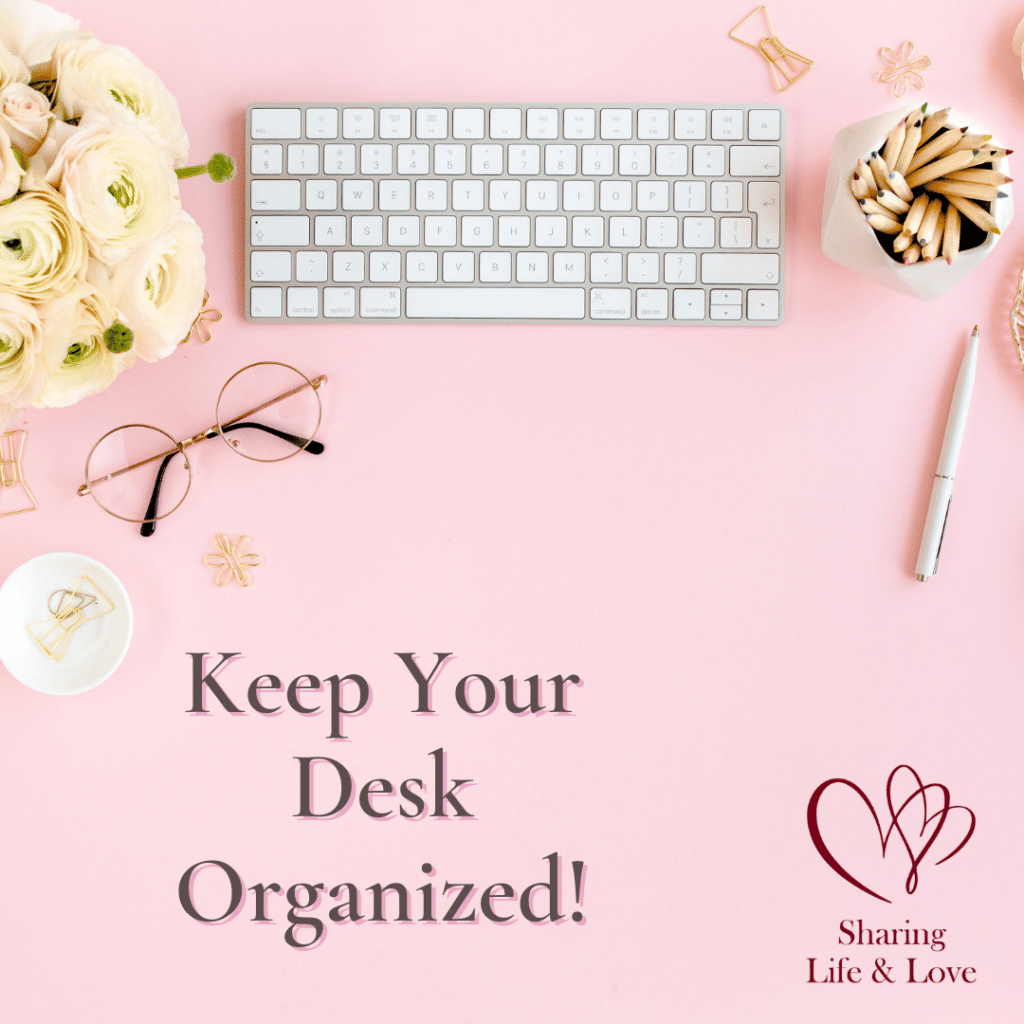
Decluttering Other Rooms
When you go through other rooms in your house, remember that you do not need to keep every single thing. Pick your favorites, and let the rest go. You don’t need to have everything, especially if you do not have room for it.
What do you comfortably have room for? Which are your favorite things?
Pet Rooms. As you go through the rooms where your pets stay and play, be sure to get rid of or donate any toys they no longer play with. Keep only a few sentimental things.
A dog or cat rescue would benefit from a donation of a pet toy. Similarly, the Snuggles Project or your local animal shelter would benefit from any cat or dog blankets you have that aren’t being used.
Guest Rooms. If you have guest bedrooms, you may want to put your off-season clothing in the dressers and nightstands in there. However, you ought to keep a few drawers empty for your guests when they come to stay with you. You might even keep small toiletries and mints in there to make your guests feel welcome.
Other Rooms. Don’t forget the living room, laundry room, and office! You might find all sorts of things you can donate, recycle, or return to their rightful owner.
Remember to fill up your recycling bin as you go through each of the rooms in your home. Clear off all surfaces, such as your coffee tables, countertops, and nightstands.
If you clean as you go, you will find that you have an immaculate home when you are done.
Hopefully, the end result is cardboard boxes full of donations and a home that is clutter-free!
Remember to clean each space as you organize and sort the items in it. You’ll want to follow this process as you go through your home:
- Remove everything from the space.
- Sort and organize those items into one of the predetermined categories.
- Add baskets, bins, sorters, dividers, or whatever you need in the space to get it organized.
- Return the items to the space, grouping like items together.
The result is something wonderful!
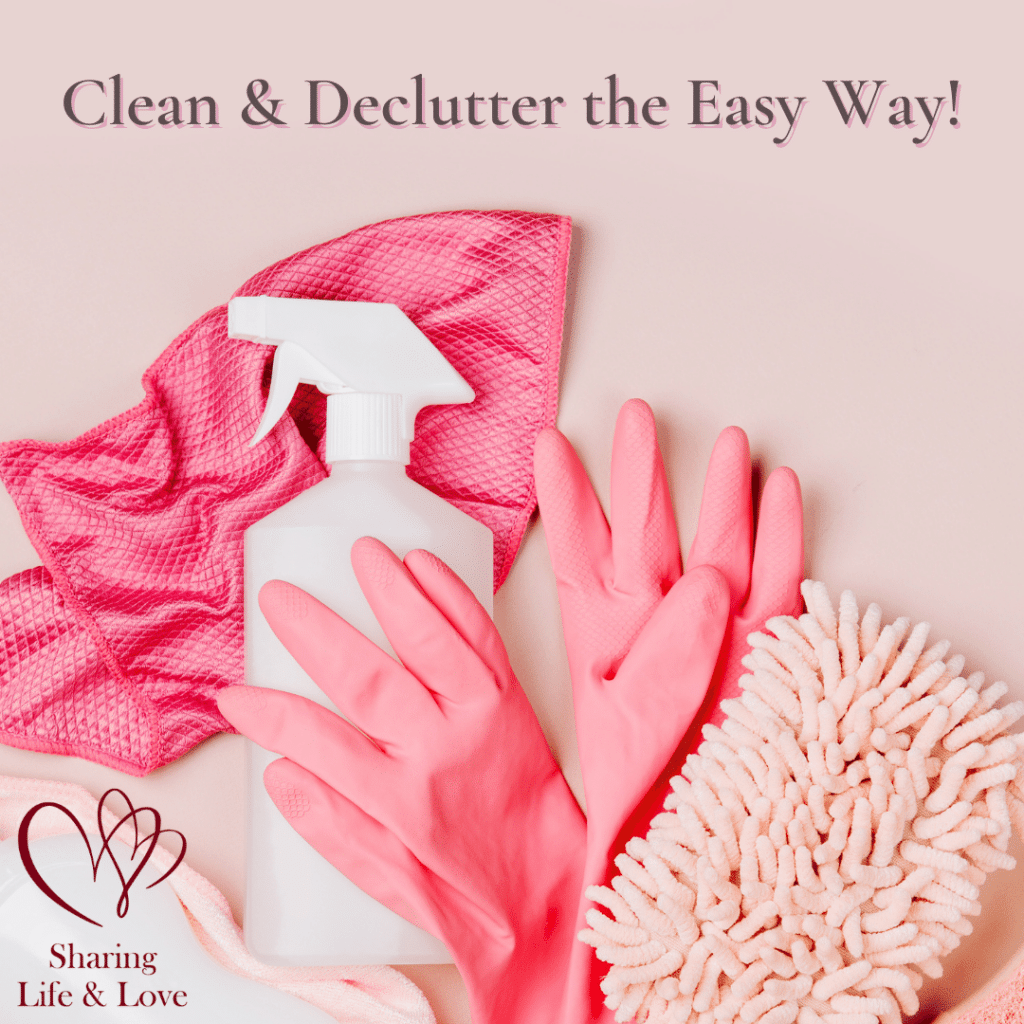
Where to Donate Your Belongings
There is a Facebook page for Declutter for a Cause that you are welcome to check out. Their page is helpful because it talks about the various causes you can be a part of, what you need to do prior to making donations, and ideas of things you can donate.
If you have pet blankets, I would recommend that you find an animal shelter in your area that participates in the Snuggles Project. You can donate homemade blankets or any blanket or throw you have around the house to this worthy cause. You can show an animal love and support while they wait for their forever home.
Consider donating to your local shelters or food banks. Most major cities have hospitals in need, local charities, homeless shelters, and shelters for victims of abuse. There are many ways you can help other people with your donations and talents.
If you crochet or knit hats, scarves, blankets, or anything else, you should consider knitting for charity. You can make beautiful items for those who are less fortunate than you.
There are many ways you can give back and volunteer all year, not just during this month. Find the right volunteer opportunity for you today so that you can feel the wonderful benefits that you will receive from giving back.
Frequently Asked Questions
What are the best decluttering tips for hoarders?
Start small. You don’t need to declutter your home in one day, and if you are a hoarder, you cannot expect that of yourself. Do one drawer or cabinet, no more, no less. Make that your goal for a week, and concentrate on that space and no other area.
What are the most effective ways of getting organized ideas?
When you take your items out of one space, clean what you plan to keep and your donations. Then, clean the space really well. You could even add dividers. Replace your belongings, and like magic, you’ve cleaned and organized that area!
What are the best decluttering apps?
Minimalism lists apps that are perfect for selling items (Decluttr), apps to help you get rid of paper (Audible), chore apps, household inventory apps, and apps that can help you get organized and stay organized. For example, apps with lists are very handy.
How can I declutter my house in 30 days?
Start with the kitchen, and focus on that area alone for an entire week. Do this with other areas of your house. Maybe work on the bedrooms in week 2, the bathrooms and kids’ rooms in week 3, and the rest of the house in week 4. Set reasonable goals!
Where do I start decluttering when overwhelmed?
I would not suggest starting in the closets. Instead, start with your silverware or junk drawer, a small area where there are like items for you to sort. Take everything out of the drawer, clean the drawer, and clean your items before you replace them. You will feel much better!
Conclusion
Hopefully, you are now ready to get organized and declutter for a cause! Just remember that the decluttering process is not something you can do overnight. You may want to hire a professional organizer if your home is out of control.
Spend time thinking about why you are doing this, and you’ll feel much better about the process as you go along!
Need more motivation? Check out my free motivational quotes download!
I would love to hear all about how you got started decluttering, what you’ve accomplished, and what ideas or tools of mine you used to get the job done! I’m all ears! I want to hear what you are going to do and who you are giving back to!
Please leave a comment, or contact me directly, so I can learn all about your efforts! If you could, I would greatly appreciate it if you would share this article on social media and anywhere else you can! I’m just starting this blog and need your help to spread the word!
Also, if you love this post, let me know, so I can write more on this topic!

